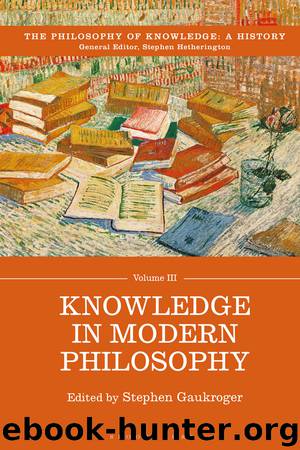Knowledge in Modern Philosophy by Stephen Gaukroger Stephen Hetherington

Author:Stephen Gaukroger,Stephen Hetherington
Language: eng
Format: epub
Publisher: Bloomsbury UK
All that a mill, or a brain, will ever give us is more parts, but mental activity cannot result from an arrangement of parts. Therefore, what thinks is not the brain.
The ‘I’ that is the locus of thought and perception is a transcendent subject, which means among other things that it endures through any and all changes in its circumstances: it is not dependent on any particular circumstances, or on the preservation of any particular quality of its perceptions, in order to be the subject it is. Thus, for Leibniz, the criterion of identity over time for a subject could not be – as it is for John Locke – the continuity of conscious experience and of memory. A substance could very well have ‘blackouts’, in which it drops into a deep slumber or stupor, from which it could then wake up without any interruption in its being. In fact, a stupor is never total; it is only a temporary relative decrease in the clarity of perceptions, so that all of these drop below the threshold of consciousness or apperception. With this view, significantly, Leibniz positions himself as a rare philosopher, prior to the era of Freud, who is willing to commit himself to the existence of subconscious mental activity, or mental activity in which the thinker is unaware of the fact that he or she or it is engaging in mental activity. It is this activity that ensures, and that is required by, the perpetual endurance of the metaphysical subject – of that in the substance that is analogous to the ‘I’.
So, consciousness and continuity of memory are not necessary for continuity of identity. Nonetheless, Leibniz agrees broadly with Locke that, as he puts in a text of the early 1680s, ‘consciousness is memory of our actions’ (1923ff: series 6, iv, 1473). We may still ask how, for Leibniz, memory is supposed to work. Clearly, knowing our previous states follows from our knowledge, however confused, of every state of every substance in the world. But we may still ask how it is that memories, or traces of previous perceptions, have the character they do, as traces of our actions in particular. Sometimes, Leibniz seeks to explain memory in the seemingly metaphorical terms of enduring ‘vibrations’. Thus, in a letter to Johann Bernoulli of 6 May 1712, Leibniz (1849–63: iii, 884–5) writes:
In organic beings many things seem to consist in perpetual, imperceptible vibrations, which, when we perceive them to be at rest, are in fact being held back by contrary vibrations. Thus in truth we are led back to an elastic force. I suspect that memory itself consists in the endurance of vibrations. Thus there does not appear to be any use for a fluid that goes by the name of animal spirits, unless it is traced back to the reason itself of the elastic force.
Download
This site does not store any files on its server. We only index and link to content provided by other sites. Please contact the content providers to delete copyright contents if any and email us, we'll remove relevant links or contents immediately.
What's Done in Darkness by Kayla Perrin(25553)
Shot Through the Heart: DI Grace Fisher 2 by Isabelle Grey(18262)
Shot Through the Heart by Mercy Celeste(18207)
The Fifty Shades Trilogy & Grey by E L James(17815)
The 3rd Cycle of the Betrayed Series Collection: Extremely Controversial Historical Thrillers (Betrayed Series Boxed set) by McCray Carolyn(13235)
The Subtle Art of Not Giving a F*ck by Mark Manson(12982)
Scorched Earth by Nick Kyme(11885)
Stepbrother Stories 2 - 21 Taboo Story Collection (Brother Sister Stepbrother Stepsister Taboo Pseudo Incest Family Virgin Creampie Pregnant Forced Pregnancy Breeding) by Roxi Harding(11139)
Drei Generationen auf dem Jakobsweg by Stein Pia(10260)
Suna by Ziefle Pia(10217)
Scythe by Neal Shusterman(9325)
International Relations from the Global South; Worlds of Difference; First Edition by Arlene B. Tickner & Karen Smith(8681)
Successful Proposal Strategies for Small Businesses: Using Knowledge Management ot Win Govenment, Private Sector, and International Contracts 3rd Edition by Robert Frey(8465)
This is Going to Hurt by Adam Kay(7772)
Dirty Filthy Fix: A Fixed Trilogy Novella by Laurelin Paige(6498)
He Loves Me...KNOT by RC Boldt(5845)
How to Make Love to a Negro Without Getting Tired by Dany LaFerrière(5451)
Interdimensional Brothel by F4U(5343)
Thankful For Her by Alexa Riley(5232)
